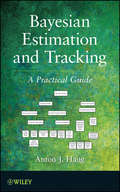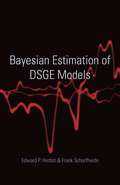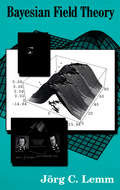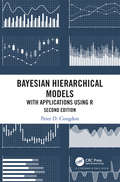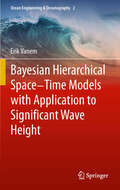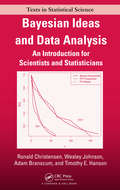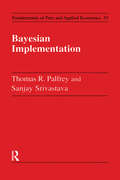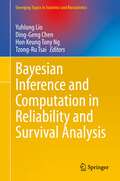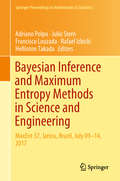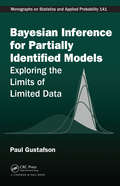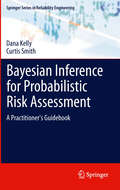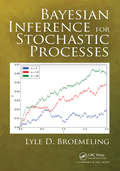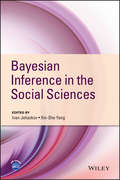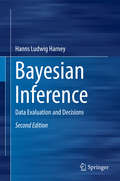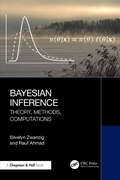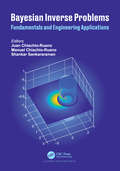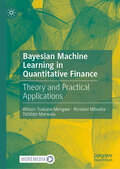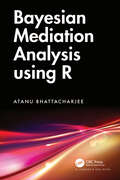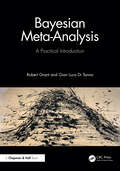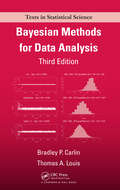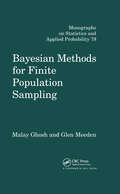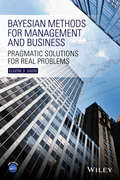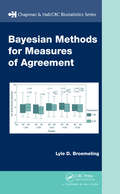- Table View
- List View
Bayesian Estimation and Tracking: A Practical Guide
by Anton J. HaugA practical approach to estimating and tracking dynamic systems in real-worl applicationsMuch of the literature on performing estimation for non-Gaussian systems is short on practical methodology, while Gaussian methods often lack a cohesive derivation. Bayesian Estimation and Tracking addresses the gap in the field on both accounts, providing readers with a comprehensive overview of methods for estimating both linear and nonlinear dynamic systems driven by Gaussian and non-Gaussian noices.Featuring a unified approach to Bayesian estimation and tracking, the book emphasizes the derivation of all tracking algorithms within a Bayesian framework and describes effective numerical methods for evaluating density-weighted integrals, including linear and nonlinear Kalman filters for Gaussian-weighted integrals and particle filters for non-Gaussian cases. The author first emphasizes detailed derivations from first principles of eeach estimation method and goes on to use illustrative and detailed step-by-step instructions for each method that makes coding of the tracking filter simple and easy to understand.Case studies are employed to showcase applications of the discussed topics. In addition, the book supplies block diagrams for each algorithm, allowing readers to develop their own MATLAB® toolbox of estimation methods.Bayesian Estimation and Tracking is an excellent book for courses on estimation and tracking methods at the graduate level. The book also serves as a valuable reference for research scientists, mathematicians, and engineers seeking a deeper understanding of the topics.
Bayesian Estimation of DSGE Models
by Frank Schorfheide Edward P. HerbstDynamic stochastic general equilibrium (DSGE) models have become one of the workhorses of modern macroeconomics and are extensively used for academic research as well as forecasting and policy analysis at central banks. This book introduces readers to state-of-the-art computational techniques used in the Bayesian analysis of DSGE models. The book covers Markov chain Monte Carlo techniques for linearized DSGE models, novel sequential Monte Carlo methods that can be used for parameter inference, and the estimation of nonlinear DSGE models based on particle filter approximations of the likelihood function. The theoretical foundations of the algorithms are discussed in depth, and detailed empirical applications and numerical illustrations are provided. The book also gives invaluable advice on how to tailor these algorithms to specific applications and assess the accuracy and reliability of the computations.Bayesian Estimation of DSGE Models is essential reading for graduate students, academic researchers, and practitioners at policy institutions.
Bayesian Evolutionary Analysis with BEAST
by Alexei J. Drummond Remco R. BouckaertWhat are the models used in phylogenetic analysis and what exactly is involved in Bayesian evolutionary analysis using Markov chain Monte Carlo (MCMC) methods? How can you choose and apply these models, which parameterisations and priors make sense, and how can you diagnose Bayesian MCMC when things go wrong? These are just a few of the questions answered in this comprehensive overview of Bayesian approaches to phylogenetics. This practical guide: - Addresses the theoretical aspects of the field - Advises on how to prepare and perform phylogenetic analysis - Helps with interpreting analyses and visualisation of phylogenies - Describes the software architecture - Helps developing BEAST 2. 2 extensions to allow these models to be extended further. With an accompanying website providing example files and tutorials (http://beast2. org/), this one-stop reference to applying the latest phylogenetic models in BEAST 2 will provide essential guidance for all users - from those using phylogenetic tools, to computational biologists and Bayesian statisticians.
Bayesian Field Theory
by Jörg C. LemmAsk a traditional mathematician the likely outcome of a coin-toss, and he will reply that no evidence exists on which to base such a prediction. Ask a Bayesian, and he will examine the coin, conclude that it was probably not tampered with, and predict five hundred heads in a thousand tosses; a subsequent experiment would then be used to refine this prediction. The Bayesian approach, in other words, permits the use of prior knowledge when testing a hypothesis.Long the province of mathematicians and statisticians, Bayesian methods are applied in this ground-breaking book to problems in cutting-edge physics. Joerg Lemm offers practical examples of Bayesian analysis for the physicist working in such areas as neural networks, artificial intelligence, and inverse problems in quantum theory. The book also includes nonparametric density estimation problems, including, as special cases, nonparametric regression and pattern recognition. Thought-provoking and sure to be controversial, Bayesian Field Theory will be of interest to physicists as well as to other specialists in the rapidly growing number of fields that make use of Bayesian methods.
Bayesian Hierarchical Models: With Applications Using R, Second Edition
by Peter CongdonAn intermediate-level treatment of Bayesian hierarchical models and their applications, this book demonstrates the advantages of a Bayesian approach to data sets involving inferences for collections of related units or variables, and in methods where parameters can be treated as random collections. Through illustrative data analysis and attention to statistical computing, this book facilitates practical implementation of Bayesian hierarchical methods. <p><p>The new edition is a revision of the book Applied Bayesian Hierarchical Methods. It maintains a focus on applied modelling and data analysis, but now using entirely R-based Bayesian computing options. It has been updated with a new chapter on regression for causal effects, and one on computing options and strategies. This latter chapter is particularly important, due to recent advances in Bayesian computing and estimation, including the development of rjags and rstan. It also features updates throughout with new examples. <p><p>The examples exploit and illustrate the broader advantages of the R computing environment, while allowing readers to explore alternative likelihood assumptions, regression structures, and assumptions on prior densities. <p><p>Features: <li>Provides a comprehensive and accessible overview of applied Bayesian hierarchical modelling <li>Includes many real data examples to illustrate topics <li>R code (based on rjags, jagsUI, R2OpenBUGS, and rstan) is integrated into the book, emphasizing implementation <li>Software options and coding principles are introduced in new chapter on computing <li>Programs and data sets available on the book’s website
Bayesian Hierarchical Space-Time Models with Application to Significant Wave Height (Ocean Engineering & Oceanography #2)
by Erik VanemThis book provides an example of a thorough statistical treatment of ocean wave data in space and time. It demonstrates how the flexible framework of Bayesian hierarchical space-time models can be applied to oceanographic processes such as significant wave height in order to describe dependence structures and uncertainties in the data. This monograph is a research book and it is partly cross-disciplinary. The methodology itself is firmly rooted in the statistical research tradition, based on probability theory and stochastic processes. However, that methodology has been applied to a problem in the field of physical oceanography, analyzing data for significant wave height, which is of crucial importance to ocean engineering disciplines. Indeed, the statistical properties of significant wave height are important for the design, construction and operation of ships and other marine and coastal structures. Furthermore, the book addresses the question of whether climate change has an effect of the ocean wave climate, and if so what that effect might be. Thus, this book is an important contribution to the ongoing debate on climate change, its implications and how to adapt to a changing climate, with a particular focus on the maritime industries and the marine environment. This book should be of value to anyone with an interest in the statistical modelling of environmental processes, and in particular to those with an interest in the ocean wave climate. It is written on a level that should be understandable to everyone with a basic background in statistics or elementary mathematics, and an introduction to some basic concepts is provided in the appendices for the uninitiated reader. The intended readership includes students and professionals involved in statistics, oceanography, ocean engineering, environmental research, climate sciences and risk assessment. Moreover, the book's findings are relevant for various stakeholders in the maritime industries such as design offices, classification societies, ship owners, yards and operators, flag states and intergovernmental agencies such as the IMO.
Bayesian Ideas and Data Analysis: An Introduction for Scientists and Statisticians (Chapman & Hall/CRC Texts in Statistical Science)
by Ronald Christensen Wesley Johnson Adam Branscum Timothy E HansonEmphasizing the use of WinBUGS and R to analyze real data, Bayesian Ideas and Data Analysis: An Introduction for Scientists and Statisticians presents statistical tools to address scientific questions. It highlights foundational issues in statistics, the importance of making accurate predictions, and the need for scientists and statisticians to col
Bayesian Implementation
by Thomas R. PalfreyThe implementation problem lies at the heart of a theory of institutions. Simply stated, the aim of implementation theory is to investigate in a rigorous way the relationships between outcomes in a society and how those outcomes arise. The first part of "Bayesian Implementation" presents a basic model of the Bayesian implementation problem and summarizes and explains recent developments in this branch of implementation theory. Substantive problems of interest such as public goods provision, auctions and bargaining are special cases of the model, and these are addressed in subsequent chapters.
Bayesian Inference and Computation in Reliability and Survival Analysis (Emerging Topics in Statistics and Biostatistics)
by Hon Keung Tony Ng Ding-Geng Chen Yuhlong Lio Tzong-Ru TsaiBayesian analysis is one of the important tools for statistical modelling and inference. Bayesian frameworks and methods have been successfully applied to solve practical problems in reliability and survival analysis, which have a wide range of real world applications in medical and biological sciences, social and economic sciences, and engineering. In the past few decades, significant developments of Bayesian inference have been made by many researchers, and advancements in computational technology and computer performance has laid the groundwork for new opportunities in Bayesian computation for practitioners.Because these theoretical and technological developments introduce new questions and challenges, and increase the complexity of the Bayesian framework, this book brings together experts engaged in groundbreaking research on Bayesian inference and computation to discuss important issues, with emphasis on applications to reliability and survival analysis. Topics covered are timely and have the potential to influence the interacting worlds of biostatistics, engineering, medical sciences, statistics, and more. The included chapters present current methods, theories, and applications in the diverse area of biostatistical analysis. The volume as a whole serves as reference in driving quality global health research.
Bayesian Inference and Maximum Entropy Methods in Science and Engineering: MaxEnt 37, Jarinu, Brazil, July 09–14, 2017 (Springer Proceedings in Mathematics & Statistics #239)
by Adriano Polpo Francisco Louzada Julio Stern Rafael Izbicki Hellinton TakadaThese proceedings from the 37th International Workshop on Bayesian Inference and Maximum Entropy Methods in Science and Engineering (MaxEnt 2017), held in São Carlos, Brazil, aim to expand the available research on Bayesian methods and promote their application in the scientific community. They gather research from scholars in many different fields who use inductive statistics methods and focus on the foundations of the Bayesian paradigm, their comparison to objectivistic or frequentist statistics counterparts, and their appropriate applications. Interest in the foundations of inductive statistics has been growing with the increasing availability of Bayesian methodological alternatives, and scientists now face much more difficult choices in finding the optimal methods to apply to their problems. By carefully examining and discussing the relevant foundations, the scientific community can avoid applying Bayesian methods on a merely ad hoc basis. For over 35 years, the MaxEnt workshops have explored the use of Bayesian and Maximum Entropy methods in scientific and engineering application contexts. The workshops welcome contributions on all aspects of probabilistic inference, including novel techniques and applications, and work that sheds new light on the foundations of inference. Areas of application in these workshops include astronomy and astrophysics, chemistry, communications theory, cosmology, climate studies, earth science, fluid mechanics, genetics, geophysics, machine learning, materials science, medical imaging, nanoscience, source separation, thermodynamics (equilibrium and non-equilibrium), particle physics, plasma physics, quantum mechanics, robotics, and the social sciences. Bayesian computational techniques such as Markov chain Monte Carlo sampling are also regular topics, as are approximate inferential methods. Foundational issues involving probability theory and information theory, as well as novel applications of inference to illuminate the foundations of physical theories, are also of keen interest.
Bayesian Inference for Partially Identified Models: Exploring the Limits of Limited Data (Chapman & Hall/CRC Monographs on Statistics and Applied Probability)
by Paul GustafsonBayesian Inference for Partially Identified Models: Exploring the Limits of Limited Data shows how the Bayesian approach to inference is applicable to partially identified models (PIMs) and examines the performance of Bayesian procedures in partially identified contexts. Drawing on his many years of research in this area, the author presents a thorough overview of the statistical theory, properties, and applications of PIMs.The book first describes how reparameterization can assist in computing posterior quantities and providing insight into the properties of Bayesian estimators. It next compares partial identification and model misspecification, discussing which is the lesser of the two evils. The author then works through PIM examples in depth, examining the ramifications of partial identification in terms of how inferences change and the extent to which they sharpen as more data accumulate. He also explains how to characterize the value of information obtained from data in a partially identified context and explores some recent applications of PIMs. In the final chapter, the author shares his thoughts on the past and present state of research on partial identification.This book helps readers understand how to use Bayesian methods for analyzing PIMs. Readers will recognize under what circumstances a posterior distribution on a target parameter will be usefully narrow versus uselessly wide.
Bayesian Inference for Probabilistic Risk Assessment: A Practitioner's Guidebook (Springer Series in Reliability Engineering)
by Dana Kelly Curtis SmithBayesian Inference for Probabilistic Risk Assessment provides a Bayesian foundation for framing probabilistic problems and performing inference on these problems. Inference in the book employs a modern computational approach known as Markov chain Monte Carlo (MCMC). The MCMC approach may be implemented using custom-written routines or existing general purpose commercial or open-source software. This book uses an open-source program called OpenBUGS (commonly referred to as WinBUGS) to solve the inference problems that are described. A powerful feature of OpenBUGS is its automatic selection of an appropriate MCMC sampling scheme for a given problem. The authors provide analysis "building blocks" that can be modified, combined, or used as-is to solve a variety of challenging problems. The MCMC approach used is implemented via textual scripts similar to a macro-type programming language. Accompanying most scripts is a graphical Bayesian network illustrating the elements of the script and the overall inference problem being solved. Bayesian Inference for Probabilistic Risk Assessment also covers the important topics of MCMC convergence and Bayesian model checking. Bayesian Inference for Probabilistic Risk Assessment is aimed at scientists and engineers who perform or review risk analyses. It provides an analytical structure for combining data and information from various sources to generate estimates of the parameters of uncertainty distributions used in risk and reliability models.
Bayesian Inference for Stochastic Processes
by Lyle D. BroemelingThis is the first book designed to introduce Bayesian inference procedures for stochastic processes. There are clear advantages to the Bayesian approach (including the optimal use of prior information). Initially, the book begins with a brief review of Bayesian inference and uses many examples relevant to the analysis of stochastic processes, including the four major types, namely those with discrete time and discrete state space and continuous time and continuous state space. The elements necessary to understanding stochastic processes are then introduced, followed by chapters devoted to the Bayesian analysis of such processes. It is important that a chapter devoted to the fundamental concepts in stochastic processes is included. Bayesian inference (estimation, testing hypotheses, and prediction) for discrete time Markov chains, for Markov jump processes, for normal processes (e.g. Brownian motion and the Ornstein–Uhlenbeck process), for traditional time series, and, lastly, for point and spatial processes are described in detail. Heavy emphasis is placed on many examples taken from biology and other scientific disciplines. In order analyses of stochastic processes, it will use R and WinBUGS. <P><P>Features: <li>Uses the Bayesian approach to make statistical Inferences about stochastic processes <li>The R package is used to simulate realizations from different types of processes <li>Based on realizations from stochastic processes, the WinBUGS package will provide the Bayesian analysis (estimation, testing hypotheses, and prediction) for the unknown parameters of stochastic processes <li>To illustrate the Bayesian inference, many examples taken from biology, economics, and astronomy will reinforce the basic concepts of the subject <li>A practical approach is implemented by considering realistic examples of interest to the scientific community <li>WinBUGS and R code are provided in the text, allowing the reader to easily verify the results of the inferential procedures found in the many examples of the book <P><P>Readers with a good background in two areas, probability theory and statistical inference, should be able to master the essential ideas of this book.
Bayesian Inference in the Social Sciences
by Xin-She Yang Ivan JeliazkovPresents new models, methods, and techniques and considers important real-world applications in political science, sociology, economics, marketing, and financeEmphasizing interdisciplinary coverage, Bayesian Inference in the Social Sciences builds upon the recent growth in Bayesian methodology and examines an array of topics in model formulation, estimation, and applications. The book presents recent and trending developments in a diverse, yet closely integrated, set of research topics within the social sciences and facilitates the transmission of new ideas and methodology across disciplines while maintaining manageability, coherence, and a clear focus.Bayesian Inference in the Social Sciences features innovative methodology and novel applications in addition to new theoretical developments and modeling approaches, including the formulation and analysis of models with partial observability, sample selection, and incomplete data. Additional areas of inquiry include a Bayesian derivation of empirical likelihood and method of moment estimators, and the analysis of treatment effect models with endogeneity. The book emphasizes practical implementation, reviews and extends estimation algorithms, and examines innovative applications in a multitude of fields. Time series techniques and algorithms are discussed for stochastic volatility, dynamic factor, and time-varying parameter models. Additional features include:Real-world applications and case studies that highlight asset pricing under fat-tailed distributions, price indifference modeling and market segmentation, analysis of dynamic networks, ethnic minorities and civil war, school choice effects, and business cycles and macroeconomic performanceState-of-the-art computational tools and Markov chain Monte Carlo algorithms with related materials available via the book's supplemental websiteInterdisciplinary coverage from well-known international scholars and practitionersBayesian Inference in the Social Sciences is an ideal reference for researchers in economics, political science, sociology, and business as well as an excellent resource for academic, government, and regulation agencies. The book is also useful for graduate-level courses in applied econometrics, statistics, mathematical modeling and simulation, numerical methods, computational analysis, and the social sciences.
Bayesian Inference: Data Evaluation and Decisions
by Hanns Ludwig HarneyThis new edition offers a comprehensive introduction to the analysis of data using Bayes rule. It generalizes Gaussian error intervals to situations in which the data follow distributions other than Gaussian. This is particularly useful when the observed parameter is barely above the background or the histogram of multiparametric data contains many empty bins, so that the determination of the validity of a theory cannot be based on the chi-squared-criterion. In addition to the solutions of practical problems, this approach provides an epistemic insight: the logic of quantum mechanics is obtained as the logic of unbiased inference from counting data. New sections feature factorizing parameters, commuting parameters, observables in quantum mechanics, the art of fitting with coherent and with incoherent alternatives and fitting with multinomial distribution. Additional problems and examples help deepen the knowledge. Requiring no knowledge of quantum mechanics, the book is written on introductory level, with many examples and exercises, for advanced undergraduate and graduate students in the physical sciences, planning to, or working in, fields such as medical physics, nuclear physics, quantum mechanics, and chaos.
Bayesian Inference: Theory, Methods, Computations
by Silvelyn Zwanzig Rauf AhmadBayesian Inference: Theory, Methods, Computations provides a comprehensive coverage of the fundamentals of Bayesian inference from all important perspectives, namely theory, methods and computations.All theoretical results are presented as formal theorems, corollaries, lemmas etc., furnished with detailed proofs. The theoretical ideas are explained in simple and easily comprehensible forms, supplemented with several examples. A clear reasoning on the validity, usefulness, and pragmatic approach of the Bayesian methods is provided. A large number of examples and exercises, and solutions to all exercises, are provided to help students understand the concepts through ample practice. The book is primarily aimed at first or second semester master students, where parts of the book can also be used at Ph.D. level or by research community at large. The emphasis is on exact cases. However, to gain further insight into the core concepts, an entire chapter is dedicated to computer intensive techniques. Selected chapters and sections of the book can be used for a one-semester course on Bayesian statistics.Key Features: Explains basic ideas of Bayesian statistical inference in an easily comprehensible form Illustrates main ideas through sketches and plots Contains large number of examples and exercises Provides solutions to all exercises Includes R codes Silvelyn Zwanzig is a Professor for Mathematical Statistics at Uppsala University. She studied Mathematics at the Humboldt University of Berlin. Before coming to Sweden, she was Assistant Professor at the University of Hamburg in Germany. She received her Ph.D. in Mathematics at the Academy of Sciences of the GDR. She has taught Statistics to undergraduate and graduate students since 1991. Her research interests include theoretical statistics and computer-intensive methods.Rauf Ahmad is Associate Professor at the Department of Statistics, Uppsala University. He did his Ph.D. at the University of Göttingen, Germany. Before joining Uppsala University, he worked at the Division of Mathematical Statistics, Department of Mathematics, Linköping University, and at Biometry Division, Swedish University of Agricultural Sciences, Uppsala. He has taught Statistics to undergraduate and graduate students since 1995. His research interests include high-dimensional inference, mathematical statistics, and U-statistics.
Bayesian Inverse Problems: Fundamentals and Engineering Applications
by Juan Chiachío-RuanoThis book is devoted to a special class of engineering problems called Bayesian inverse problems. These problems comprise not only the probabilistic Bayesian formulation of engineering problems, but also the associated stochastic simulation methods needed to solve them. Through this book, the reader will learn how this class of methods can be useful to rigorously address a range of engineering problems where empirical data and fundamental knowledge come into play. The book is written for a non-expert audience and it is contributed to by many of the most renowned academic experts in this field.
Bayesian Machine Learning in Quantitative Finance: Theory and Practical Applications
by Tshilidzi Marwala Wilson Tsakane Mongwe Rendani MbuvhaThis book offers a comprehensive discussion of the Bayesian inference framework and demonstrates why this probabilistic approach is ideal for tackling the various modelling problems within quantitative finance. It demonstrates how advanced Bayesian machine learning techniques can be applied within financial engineering, investment portfolio management, insurance, municipal finance management as well as banking. The book covers a broad range of modelling approaches, including Bayesian neural networks, Gaussian processes and Markov Chain Monte Carlo methods. It also discusses the utility of Bayesian inference in quantitative finance and discusses future research goals in the applications of Bayesian machine learning in quantitative finance. Chapters are rooted in the theory of quantitative finance and machine learning while also outlining a range of practical considerations for implementing Bayesian techniques into real-world quantitative finance problems. This book is ideal for graduate researchers and practitioners at the intersection of machine learning and quantitative finance, as well as those working in computational statistics and computer science more broadly.
Bayesian Mediation Analysis using R
by Atanu BhattacharjeeDelve into the realm of statistical methodology for mediation analysis with a Bayesian perspective in high dimensional data through this comprehensive guide. Focused on various forms of time-to-event data methodologies, this book helps readers master the application of Bayesian mediation analysis using R. Across ten chapters, this book explores concepts of mediation analysis, survival analysis, accelerated failure time modeling, longitudinal data analysis, and competing risk modeling. Each chapter progressively unravels intricate topics, from the foundations of Bayesian approaches to advanced techniques like variable selection, bivariate survival models, and Dirichlet process priors. With practical examples and step-by-step guidance, this book empowers readers to navigate the intricate landscape of high-dimensional data analysis, fostering a deep understanding of its applications and significance in diverse fields.
Bayesian Meta-Analysis: A Practical Introduction
by Robert Grant Gian Luca Di Tanna"…this book is extremely timely…not just a technical exposition, but provides practical guidance about using different software platforms, as well as valuable advice about extracting summary statistics, eliciting prior information, communicating results, visualisation, and many other issues…reflects years of thoughtful experience, and should be of huge value to anyone faced with pooling studies into a coherent whole."~From the Foreword by Professor Sir David SpiegelhalterMeta-analysis is the statistical combination of previously conducted studies, often from summary statistics but sometimes with individual participant data. It is widespread in life sciences and is gaining popularity in economics and beyond. In many real-life meta-analyses, challenges in the source information, such as unreported statistics or biases, can be incorporated using Bayesian methods. Bayesian Meta-Analysis: A Practical Introduction provides an approachable introduction for researchers who are new to Bayes, meta-analysis, or both. There is an emphasis on hands-on learning using a variety of software packages.Key Features Introductory chapters assume no prior experience or mathematical training, and are aimed at non-statistical researchers Examples of basic meta-analyses in seven different software alternatives: BUGS, JAGS, Stan, bayesmeta, brms, Stata, and JASP Practical advice on extracting information from studies, eliciting expert opinions, managing project decisions, and writing up findings Discussion of specific problems, including publication bias, unreported statistics, and a mixture of study designs, with code examples Accompanying online blog and forum, with all code and data from the book, plus more translations to different software This book aims to bridge the gap between the researcher who wants to carry out tailored meta-analysis and the techniques they need, which have previously been available only in mathematically or computationally demanding publications.
Bayesian Methods for Data Analysis (Chapman & Hall/CRC Texts in Statistical Science)
by Bradley P. Carlin Thomas A. LouisBroadening its scope to nonstatisticians, Bayesian Methods for Data Analysis, Third Edition provides an accessible introduction to the foundations and applications of Bayesian analysis. Along with a complete reorganization of the material, this edition concentrates more on hierarchical Bayesian modeling as implemented via Markov chain Monte Carlo (
Bayesian Methods for Ecology
by Michael A. MccarthyThe interest in using Bayesian methods in ecology is increasing, however many ecologists have difficulty with conducting the required analyses. McCarthy bridges that gap, using a clear and accessible style. The text also incorporates case studies to demonstrate mark-recapture analysis, development of population models and the use of subjective judgement. The advantages of Bayesian methods, are also described here, for example, the incorporation of any relevant prior information and the ability to assess the evidence in favour of competing hypotheses. Free software is available as well as an accompanying web-site containing the data files and WinBUGS codes. Bayesian Methods for Ecology will appeal to academic researchers, upper undergraduate and graduate students of Ecology.
Bayesian Methods for Finite Population Sampling
by Malay GhoshAssuming a basic knowledge of the frequentist approach to finite population sampling, Bayesian Methods for Finite Population Sampling describes Bayesian and predictive approaches to inferential problems with an emphasis on the likelihood principle. The authors demonstrate that a variety of levels of prior information can be used in survey sampling in a Bayesian manner. Situations considered range from a noninformative Bayesian justification of standard frequentist methods when the only prior information available is the belief in the exchangeability of the units to a full-fledged Bayesian model. Intended primarily for graduate students and researchers in finite population sampling, this book will also be of interest to statisticians who use sampling and lecturers and researchers in general statistics and biostatistics.
Bayesian Methods for Management and Business
by Eugene D. HahnHIGHLIGHTS THE USE OF BAYESIAN STATISTICS TO GAIN INSIGHTS FROM EMPIRICAL DATAFeaturing an accessible approach, Bayesian Methods for Management and Business: Pragmatic Solutions for Real Problems demonstrates how Bayesian statistics can help to provide insights into important issues facing business and management. The book draws on multidisciplinary applications and examples and utilizes the freely available software WinBUGS and R to illustrate the integration of Bayesian statistics within data-rich environments.Computational issues are discussed and integrated with coverage of linear models, sensitivity analysis, Markov Chain Monte Carlo (MCMC), and model comparison. In addition, more advanced models including hierarchal models, generalized linear models, and latent variable models are presented to further bridge the theory and application in real-world usage.Bayesian Methods for Management and Business: Pragmatic Solutions for Real Problems also features:Numerous real-world examples drawn from multiple management disciplines such as strategy, international business, accounting, and information systemsAn incremental skill-building presentation based on analyzing data sets with widely applicable models of increasing complexityAn accessible treatment of Bayesian statistics that is integrated with a broad range of business and management issues and problemsA practical problem-solving approach to illustrate how Bayesian statistics can help to provide insight into important issues facing business and managementBayesian Methods for Management and Business: Pragmatic Solutions for Real Problems is an important textbook for Bayesian statistics courses at the advanced MBA-level and also for business and management PhD candidates as a first course in methodology. In addition, the book is a useful resource for management scholars and practitioners as well as business academics and practitioners who seek to broaden their methodological skill sets.
Bayesian Methods for Measures of Agreement (Chapman & Hall/CRC Biostatistics Series)
by Lyle D. BroemelingUsing WinBUGS to implement Bayesian inferences of estimation and testing hypotheses, Bayesian Methods for Measures of Agreement presents useful methods for the design and analysis of agreement studies. It focuses on agreement among the various players in the diagnostic process.The author employs a Bayesian approach to provide statistical inferences
